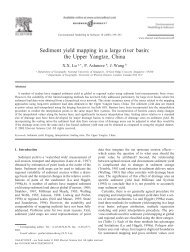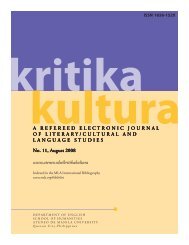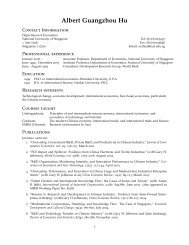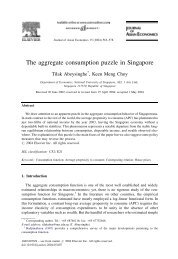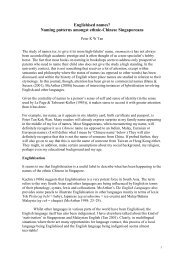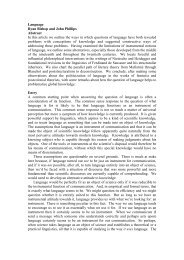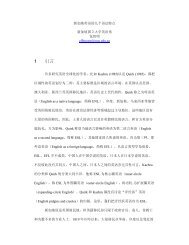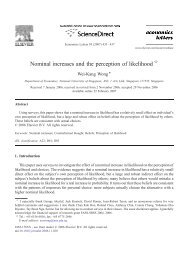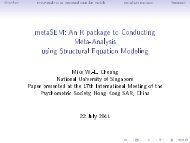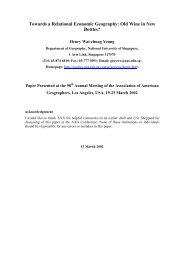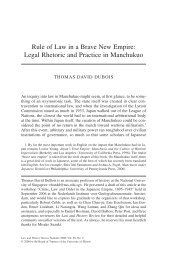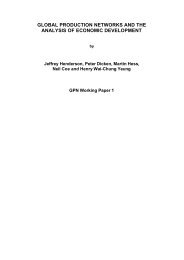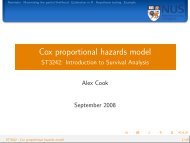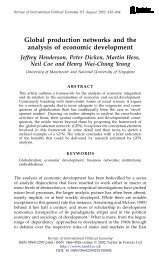Researching Hybridity in Social and Economic ... - NUS Home
Researching Hybridity in Social and Economic ... - NUS Home
Researching Hybridity in Social and Economic ... - NUS Home
Create successful ePaper yourself
Turn your PDF publications into a flip-book with our unique Google optimized e-Paper software.
welcome, but there is a danger that concentrat<strong>in</strong>g attention on actors <strong>in</strong> networks will descend<br />
<strong>in</strong>to a mechanistic framework that atomizes agents <strong>and</strong> focuses solely on the l<strong>in</strong>ks between<br />
them, without a sense of the social processes that constitute these relationships. This danger is<br />
perhaps evident <strong>in</strong> Murdoch’s (1997b: 332) methodological advice that “[n]etwork analysis is<br />
quite simple: it means follow<strong>in</strong>g networks all the way along their length; there is no need to<br />
step outside the networks for all the qualities of spatial construction <strong>and</strong> configuration of<br />
<strong>in</strong>terest will be found there<strong>in</strong>... Actor-network theorists thus reject the view that social life is<br />
arranged <strong>in</strong>to levels or tiers some of which determ<strong>in</strong>e what goes on <strong>in</strong> others; everyth<strong>in</strong>g is<br />
kept at ‘ground level’”.<br />
To beg<strong>in</strong> this track<strong>in</strong>g process, a good comb<strong>in</strong>ation of multiple sources of primary <strong>and</strong><br />
secondary data is critical to identify<strong>in</strong>g the key actors <strong>in</strong>volved <strong>in</strong> these networks. Participant<br />
observation is clearly a valid <strong>and</strong>, perhaps, reliable method to “follow through” these<br />
networks <strong>and</strong> their strategic outcomes. The reality of empirical research, however, is often not<br />
as neat as proposed <strong>in</strong> methodological “cookbooks” that are aimed at undergraduates. In my<br />
own research, I experienced premature term<strong>in</strong>ation of my participant observation of how a<br />
particular network works precisely because my identity as an academic researcher became too<br />
difficult for those bus<strong>in</strong>ess actors to h<strong>and</strong>le. Some actors <strong>in</strong> the network did not feel easy to be<br />
<strong>in</strong>cluded <strong>in</strong> the study. Methodological opportunism emerges as an appropriate guidel<strong>in</strong>e <strong>in</strong> the<br />
sense that we need to be highly receptive to <strong>and</strong> prepare for new opportunities that may open<br />
doors for us. As argued by Ward <strong>and</strong> Jones (1999) <strong>in</strong> their reflections on research<strong>in</strong>g local<br />
elites <strong>in</strong> Engl<strong>and</strong>, the political-temporal cont<strong>in</strong>gency of the research process <strong>and</strong> the<br />
politically time-specific entry made by the researcher <strong>in</strong>to the research field can significantly<br />
shape the <strong>in</strong>teraction between the researcher <strong>and</strong> the researched. In my study on Hong Kong<br />
firms, for example, I capitalized on my guanxi or personal relationships with the family<br />
members of one ethnic Ch<strong>in</strong>ese entrepreneur to arrange for <strong>in</strong>-depth <strong>in</strong>terviews. He was<br />
22



